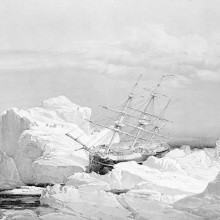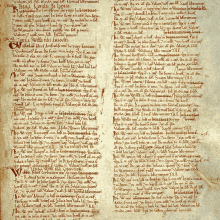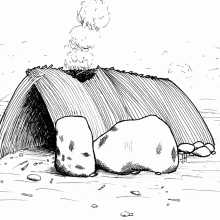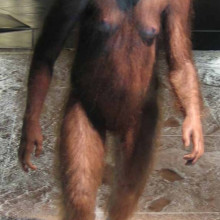Roman food: before and after
What did the Romans eat at their feasts? What came out the other end afterwards? This month we explore the toilets of Pompeii and the kinds of food eaten by its inhabitants. In the news this month: the oldest house in the UK; the HMS Investigator; and some very early human tool use. Plus, in Backyard Archaeology we find out how to put up buildings the Icelandic way.
In this episode

09:19 - Shipwrecked in the icy Canadian arctic
Shipwrecked in the icy Canadian arctic
The wreck of a 19th Century British ship has been found in the frigid waters of northern Canada.
The ship, HMS Investigator, was sent on a mission in the 1850s to uncover what had happened to Captain Sir John Franklin, an arctic explorer that had never been heard from after he set sail for the arctic. His crew had been searching for the 'north-west passage' that links the northern Atlantic and Pacific oceans.
In 1854 Franklin's ships were discovered trapped in ice. The crew had abandoned ship and gone on foot, dying of hypothermia, starvation, disease and even cannabalism.
One of the ships sent after Franklin was HMS Investigator, which itself became trapped in ice, abandoned by its crew and lost. The ship has now been found, sunk under 11m of freezing water, sitting on the ocean floor. Moreover, owing to the freezing but stable conditions, the ship is in exceptionally good condition.

13:10 - The Doomsday Book is now online!
The Doomsday Book is now online!
Doomsday book of 1066 can be seen online at www.pase.ac.uk

13:38 - Britain's oldest house is over 10,000 years old.
Britain's oldest house is over 10,000 years old.
Britain's oldest house was unearthed in Yorkshire. Identified by radiocarbing dating to be from 8,500BC, it is 500 years younger than the previous record-holder in the UK.
The finding suggests that hunter gatherers from this time period may not have been as nomadic and mobile as was previously thought, and may have settled on a more stable, longer-term basis in housing like this.

15:26 - Human ancestors used tools over 3 million years ago
Human ancestors used tools over 3 million years ago
The earliest evidence of tool-use by human ancestors has been found in Ethiopia.
Animal bones with cut marks on them indicating they were sliced by stone tools have been dated to between 3.2-3.5 million years ago. The earliest stone tools ever found are 2.5 million years old. Not only does this finding push the date of tool use first appearing back by 800,000 years, but it also means that tools were used by ancestors in the genus Australopithecus. It was previously thought that only creatures belonging to the genus Homo, such as our own species, Homo sapiens, used tools. But if this evidence is accurate it means that Australopithecines, which are the evolutionary predecessors of Homo, used tools as well.
No stone tools have actually been found; the conclusion is inferred from cut marks in bone. Nevertheless, the results give a tantalizing, if speculative, insight into hominid evolution.
17:00 - Reconstructing a Roman diet
Reconstructing a Roman diet
with Mary White, Professor of Anthropology at Boston University
What did the Romans eat? Mary White discusses how Roman feasts probably weren't the extravagant occasions imagined by people today.
23:20 - Vikings left their mark in Iceland
Vikings left their mark in Iceland
with Dawn elise mooney, University of Aberdeen
Iceland was colonised by Vikings as a pristine environment, meaning it is now a rich source of archaeological finds from these ancient people.










Comments
Add a comment